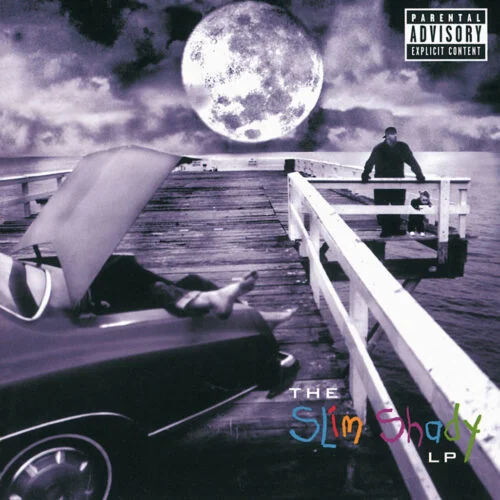
The Slim Shady LP (SSLP) is the second studio album by Eminem. It was released on February 23, 1999, by Aftermath Entertainment and Interscope Records. The album was recorded in Ferndale, Michigan, following Eminem’s recruitment by Dr. Dre and Jimmy Iovine.
The album features production from Dr. Dre, Bass Brothers, and Eminem himself.
I wanted an album so rugged nobody could touch it
— Eminem, ‘Still Don’t Give a Fuck’ lyrics
Spent a million a track and went over my budget (Oh shit)
Now, how in the fuck am I supposed to get out of debt?
I can’t rap anymore, I just murdered the alphabet”
Label: Aftermath/Interscope
Release date: 23 February 1999
Discs: 1
More about the album
Featuring West Coast hip hop, G-funk and horrorcore musical styles, the majority of The Slim Shady LP’s lyrical content is written from the perspective of Eminem’s alter ego, Slim Shady, whom he created on the Slim Shady EP (1997) and has been known for ever since. The Slim Shady LP contains cartoonish depictions of violence and heavy use of profanity, which Eminem described as horror film-esque, in that it is solely for entertainment purpose and not to be taken seriously. Although many of the lyrics on the album are considered to be satirical, Eminem also depicts his frustrations of living in poverty.
Fun story
Eminem was upset about Will Smith’s speech at the 1999 MTV Video Music Awards. After Smith’s “Miami” won over Eminem’s “My Name Is” for Best Male Video, Smith said:
I never killed anybody in none of my records. I never used no profanity in none of my records and I still managed to get up here.
—Will Smith, 1999 MTV Video Music Awards Best Male Video acceptance speech
Marshall did not appreciate him berating him and the whole genre of music so dear to him, so he replied in his own way, the best he knows how, through the The Real Slim Shady lyrics:
Will Smith don’t gotta cuss in his raps to sell records (Nope)
—Eminem, ‘The Real Slim Shady’ lyrics
Well, I do, so fuck him and fuck you too!
Track listing – Eminem: The Slim Shady LP
| No. | Title | Links | Writer(s) | Producer(s) | Length |
|---|---|---|---|---|---|
| 1. | “Public Service Announcement” (Skit) (performed by Jeff Bass & Eminem) | Eminem, Mel-Man | 0:33 | ||
| 2. | “My Name Is” | Mathers, Andre Young | Dr. Dre | 4:28 | |
| 3. | “Guilty Conscience” (featuring Dr. Dre) | Mathers, Young | Dr. Dre, Eminem | 3:19 | |
| 4. | “Brain Damage” | Eminem, Bass Brothers[a] | 3:46 | ||
| 5. | “Paul” (Skit) (performed by Paul Rosenberg) | Eminem, Jeff Bass[a] | 0:15 | ||
| 6. | “If I Had” | Bass Brothers, Eminem[a], DJ Rec[b] | 4:05 | ||
| 7. | “’97 Bonnie & Clyde” | Bass Brothers, Eminem[a], DJ Head[b] | 5:16 | ||
| 8. | “Bitch” (Skit) (performed by Zoe Winkler) | Eminem | 0:19 | ||
| 9. | “Role Model” | Mathers, Young, Melvin Bradford | Dr. Dre, Mel-Man | 3:25 | |
| 10. | “Lounge” (Skit) (performed by Eminem & Marky & Jeff Bass) | Eminem, Mark Bass[a] | 0:46 | ||
| 11. | “My Fault” | Bass Brothers, Eminem | 4:01 | ||
| 12. | “Ken Kaniff” (Skit) (performed by Aristotle, Eminem & M. Bass) | Jeff Bass, Mark Bass | 1:16 | ||
| 13. | “Cum on Everybody” (featuring Dina Rae) | Bass Brothers, Eminem[a] | 3:39 | ||
| 14. | “Rock Bottom” | Bass Brothers | 3:34 | ||
| 15. | “Just Don’t Give a Fuck” | Bass Brothers, Eminem[a], Denaun Porter[b] | 4:02 | ||
| 16. | “Soap” (Skit) (performed by Royce da 5’9″ & J. Bass) | Jeff Bass, Mark Bass, Eminem[a] | 0:34 | ||
| 17. | “As the World Turns” | Bass Brothers, Eminem[a], Justin Trugman[b] | 4:25 | ||
| 18. | “I’m Shady” | Bass Brothers, Eminem[a] | 3:31 | ||
| 19. | “Bad Meets Evil” (featuring Royce da 5’9″) | Mathers, Ryan Montgomery, J. Bass, M. Bass | Bass Brothers, Eminem[a] | 4:13 | |
| 20. | “Still Don’t Give a Fuck” | Bass Brothers, Eminem[a] | 4:12 | ||
| Total length: | 59:39 |
Notes:
^[a] signifies a co-producer
^[b] signifies an additional producer
On the clean version of the album, “Bitch”, “Cum on Everybody”, “Just Don’t Give a Fuck”, and “Still Don’t Give a Fuck” are respectively retitled “Zoe”, “Come on Everybody”, “Just Don’t Give”, and “Still Don’t Give”.
Singles and music videos (SSLP)
The first single, “My Name Is”, became Eminem’s first entry on the Billboard Hot 100. The rest of The Slim Shady LP singles are:
“Just Don’t Give a Fuck”
Released: October 13, 1998
“My Name Is”
Released: January 25, 1999
“Role Model”
Released: May 26, 1999
“Guilty Conscience”
Released: June 8, 1999
The Slim Shady LP: Special Edition Bonus Disc tracks
The special edition of The Slim Shady LP includes a bonus disc with the following bonuses:
| No. | Title | Length |
|---|---|---|
| 1. | “Hazardous Youth” (Acapella Version) | 0:47 |
| 2. | “Get You Mad” | 4:21 |
| 3. | “Greg” (Acapella Version) | 0:53 |
| 4. | “Just Don’t Give a Fuck” (music video) | |
| 5. | “My Name Is” (Music Video) | |
| 6. | “Guilty Conscience” (Music Video) | |
| 7. | “Role Model” (Music Video) | |
| 8. | “The Slim Shady LP” (Live & Studio Footage) |
Album Cover – Eminem: The Slim Shady LP
The album cover features Eminem, his daughter (Hailie), and a dead body in a trunk with a full moon illuminating the scene as they are parked on a peer.
The cover illustrates the song, “‘97 Bonnie and Clyde”, in which Eminem takes his young daughter with him to go dispose of the dead body of his wife Kim, Hailie’s mom. The events of how this happened are portrayed in the song Kim on Eminem’s third studio album, The Marshall Mathers LP.
The “Slim Shady” written on the bottom right has a child-like appearance and is drawn with multiple colors. It’s a characteristic often seen in patients with schizophrenia, a subtle but clever nod to Slim Shady, Eminem’s crazy side.
Album front cover
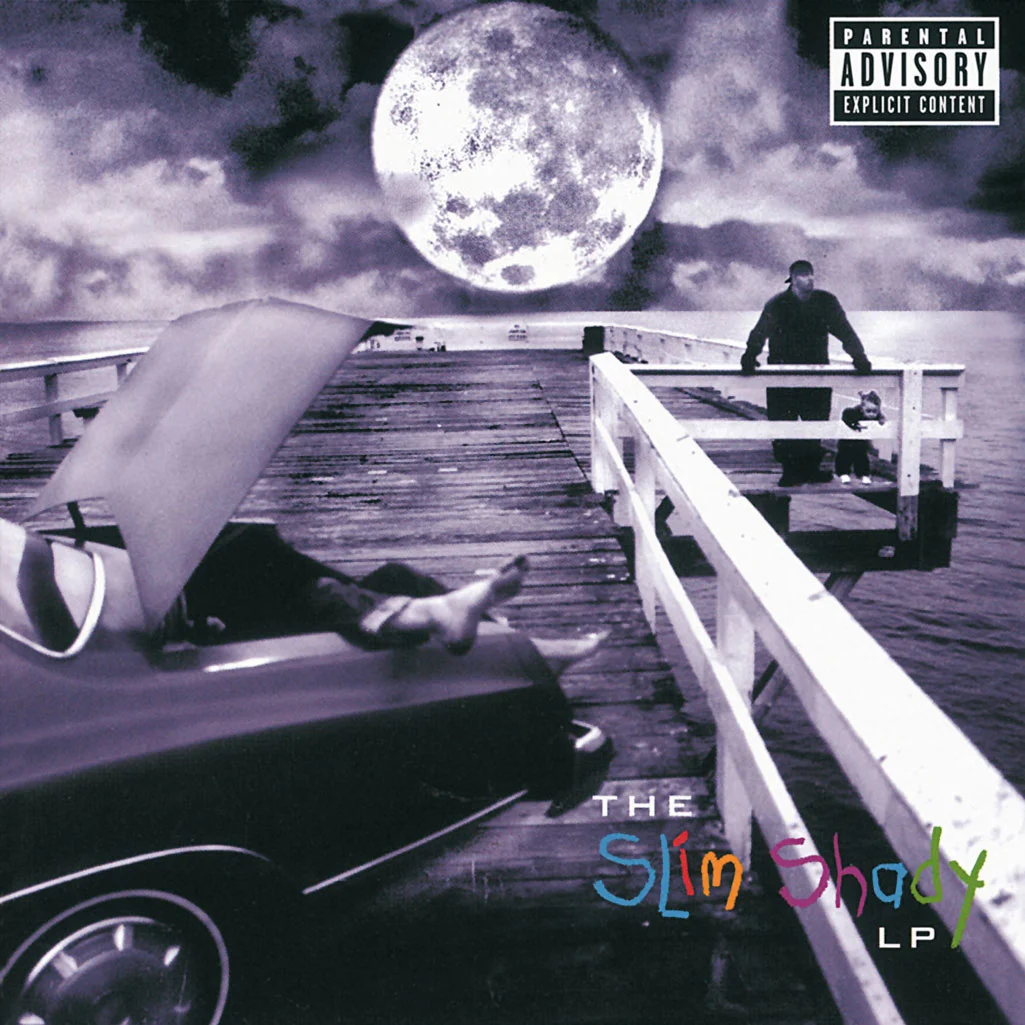
Album back cover
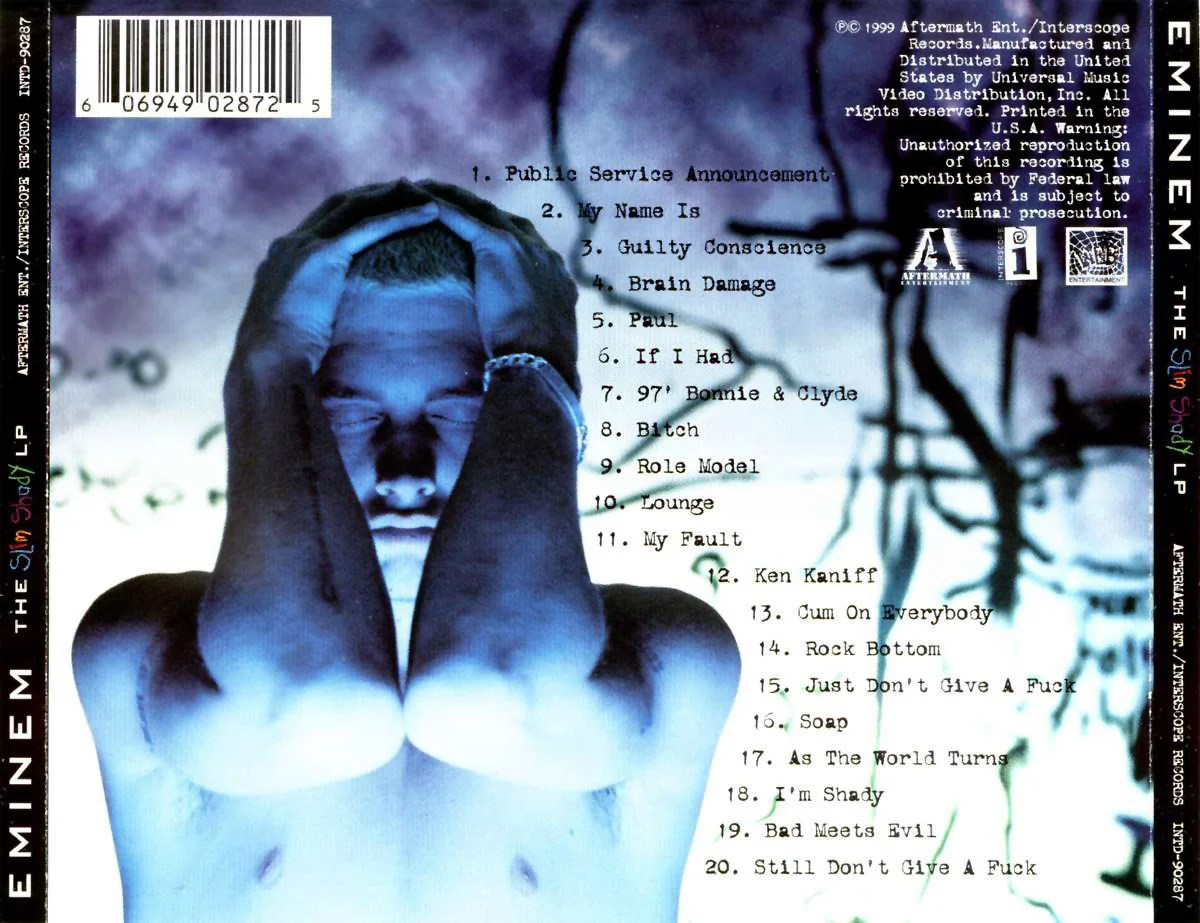
CD box art (under CD)

CD art

CD booklet

Vinyl edition
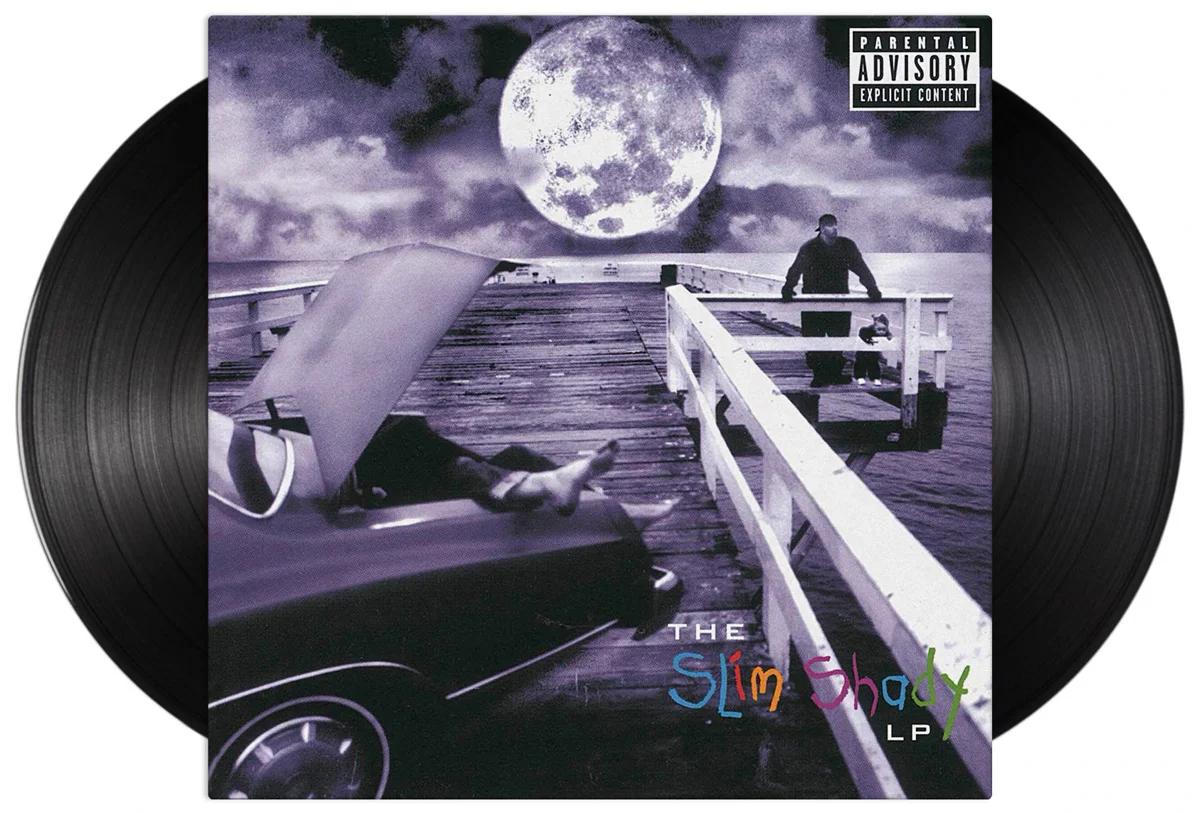
The Slim Shady LP: Special Edition cover
Special Edition – Front cover:

Special Edition – Back cover:
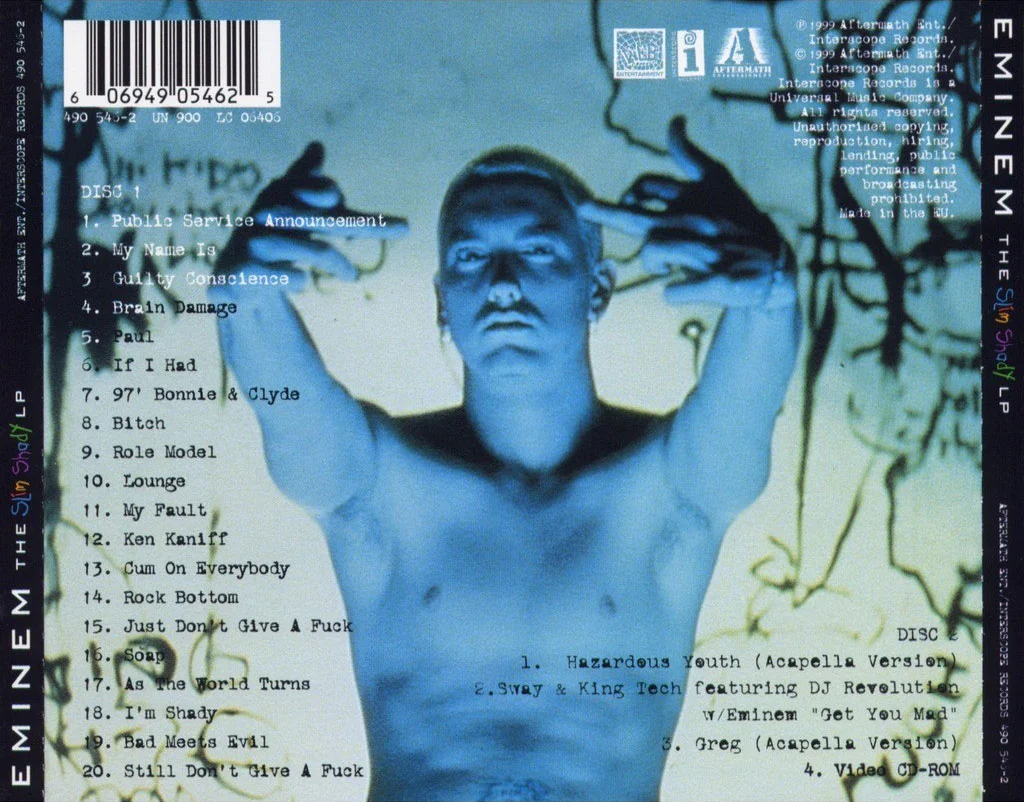
Notice how Eminem is pictured to be split down the middle in the special edition version of the cover? This is to illustrate his supposed bipolar tendencies/disassociative identity disorder which he portrays through the use of his many alter-egos. He’s not really bipolar or schizophrenic though, we don’t think.
What do critics have to say about The Slim Shady LP?
The album was met with critical acclaim. It received commercial and critical success, with critics praising Eminem for his unique lyrical style, dark humor lyrics, and eccentric personality.
Stephen Thomas Erlewine of AllMusic gave The Slim Shady LP five stars out of five, praising Eminem’s “expansive vocabulary and vivid imagination”, adding that “Years later, as the shock has faded, it’s those lyrical skills and the subtle mastery of the music that still resonate, and they’re what make The Slim Shady LP one of the great debuts in both hip-hop and modern pop music.”
David Browne of Entertainment Weekly described the album’s “unapologetic outrageousness” as a reaction to the “soul positivity” of conscious hip hop, noting that “The Slim Shady LP marks the return of irreverent, wiseass attitude to the genre, heard throughout the album in its nonstop barrage of crudely funny rhymes … Even pop fans deadened to graphic lyrics are likely to flinch.”
Soren Baker of the Los Angeles Times gave the album three and a half stars out of four and stated that “He isn’t afraid to say anything; his lyrics are so clever that he makes murder sound as if it’s a funny act he may indulge in simply to pass the time” but lamented the “sometimes flat production that takes away from the power of Eminem’s verbal mayhem.”
Many reviewers commented on the album’s lyrical content.
Gilbert Rodman of Popular Communications writes, “Eminem’s music contains more than its fair share of misogynistic and homophobic lyrics, but simply to reduce it to these (as many critics do) doesn’t help to explain Eminem. It merely invokes a platitude or a sound bite to explain him away.”
Rob Sheffield of Rolling Stone enjoyed the record’s comedic nature, saying “Simply put: Eminem will crack you up”, but he also felt that the misogynistic lyrics grow tiresome, stating that “the wife-killing jokes of “97 Bonnie and Clyde’ aren’t any funnier than Garth Brooks’, and ‘My Fault’ belongs on some sorry-ass Bloodhound Gang record.”
Nathan Rabin of The A.V. Club felt that although the album is “sophomoric and uninspired” at times, Eminem’s “surreal, ultraviolent, trailer-trash/post-gangsta-rap extremism is at least a breath of fresh air in a rap world that’s despairingly low on new ideas.”
Mike Rubin of Spin wrote that “his scenarios are so far-fetched the songs almost never sound as ugly as they actually are.”
Chris Dafoe of The Globe and Mail wrote that “Abused by fellow students and teachers, cheated on by his girlfriend, despised by society, Shady goes over the top now and then – or rather way over the top – but Dre’s lean production, full of strange voice and comic interjections, hold things together.”
Reviewing for The Village Voice in 1999, Robert Christgau called the record a “platinum-bound cause celebre” and, despite succumbing to “dull sensationalism” toward the end, Eminem shows “more comic genius than any pop musician since”, possibly, Loudon Wainwright III.”
The fans loved it and still do.
Controversy
Eminem instantly became a highly controversial figure, mainly due to his lyrical content. Some of the lyrics have been considered to be misogynistic by critics and commentators.
Eminem acknowledged the accusations, and clarified:
“I have a fairly salty relationship with women … But most of the time, when I’m saying shit about women, when I’m saying ‘bitches’ and ‘hoes’, it’s so ridiculous that I’m taking the stereotypical rapper to the extreme. I don’t hate women in general. They just make me mad sometimes.'”
— Eminem
He was labeled as “misogynist, a nihilist and an advocate of domestic violence”, and in an editorial by Billboard editor in chief Timothy White, the writer accused Eminem of “making money by exploiting the world’s misery.”
During a radio interview in San Francisco, Eminem reportedly angered local DJ Sista Tamu due to a freestyle about “slapping a pregnant bitch” to the extent that on air she broke a copy of The Slim Shady LP. Eminem defended himself by saying:
“My album isn’t for younger kids to hear. It has an advisory sticker, and you must be eighteen to get it. That doesn’t mean younger kids won’t get it, but I’m not responsible for every kid out there. I’m not a role model, and I don’t claim to be.”
— Eminem
Lawsuits
Deborah Nelson (The mom)
On September 17, 1999, Eminem’s mother, Deborah Nelson, filed a $10 million lawsuit against him for slander based on his claim that she uses drugs in the line “I just found out my mom does more dope than I do” from “My Name Is”. After a two year long trial, she was awarded $25,000, of which she only received $1,600 after legal fees.
DeAngelo Bailey (The bully)
In December 2001, DeAngelo Bailey, a janitor living in Roseville, Michigan who was made the subject of the song “Brain Damage” in which he is portrayed as a school bully, filed a $1 million lawsuit against Eminem for slander and invasion of privacy.
Bailey’s attorney stated “Eminem is a Caucasian male who faced criticism within the music industry that he had not suffered through difficult circumstances growing up and he was therefore a ‘pretender’ in the industry … Eminem used Bailey, his African-American childhood schoolmate, as a pawn in his effort to stem the tide of criticism.”
In 1982, Eminem’s mother unsuccessfully sued the Roseville school district for not protecting her son, as she claimed that attacks from bullies caused him headaches, nausea, and antisocial behavior. Additionally, Bailey had previously admitted to bullying Eminem in the April 1999 issue of Rolling Stone Magazine.
The lawsuit was dismissed by judge Deborah Servitto in 2003, who wrote her ruling in the form of rap-like rhyme. She ruled that the lyrics—which include the school principal collaborating with Bailey, and Eminem’s entire brain falling out of his head—were too exaggerated for a listener to believe that they were recalling an actual event. The verdict was upheld in 2005, and Bailey’s lawyer ruled out any further appeals.
